Day One Travel Guides: Destination United Kingdom (16 vols.)
Digital Logos Edition
Overview
Day One Travel Guides: Destination United Kingdom is an introduction to the people and places of the United Kingdom that have impacted our Christian heritage. See the Belfast streets that C.S. Lewis enjoyed as a child, or tour the Gloucester countryside where William Tyndale lived. Full color photographs, illustrations, and maps bring the stories of Britain’s most influential Christians to life. Volumes on Oxford, Cambridge, and Parliament detail the Christian history of these locations tracing major figures and movements associated with each place. This unique approach to studying history will inspire readers with a clearer vision of people and places that have shaped our Christian heritage.
For more travel guides check out the Day One Travel Guide Series (25 vols.).

Key Features
- Provides maps and travel information
- Presents engaging stories about key people and places in Christian history
- Contains over 150 color photographs and illustrations
Product Details
- Title: Day One Travel Guides: Destination United Kingdom
- Series: Day One Travel Guides
- Publisher: Day One
- Volumes: 16
- Pages: 2,048
- Resource Type: Biography, Handbooks
- Topic: History
Individual Titles
- Travel through Oxford by Andrew Atherstone
- Travel through Cambridge by David Berkley
- Travel through the Houses of Parliament by Andrew Atherstone
- Travel with C.S. Lewis by Ronald Bresland
- Travel with C.H. Spurgeon by Clive Anderson
- Travel with J.C. Ryle by Alan Munden
- Travel with John Blanchard by Brian H. Edwards
- Travel with John Bunyan by John Pestell
- Travel with Martyn Lloyd-Jones by Philip Eveson
- Travel with the Martyrs of Mary Tudor by Andrew Atherstone
- Travel with William Wilberforce by Kevin Belmonte
- Travel with William Booth by Jim Winter
- Travel with Williams Carey by Paul Pease
- Travel with William Cowper by Paul Williams
- Travel with William Grimshaw by Fred Perry
- Travel with William Tyndale by Brian H. Edwards
This title is included in the following collections
You can save when you purchase this product as part of a collection.
Day One Travel Guide Series (2...
$269.99$269.99Logos 9 Reformed Platinum Lega...
$1,499.99$1,499.99Logos 9 Reformed Diamond Legac...
$2,999.99$2,999.99Logos 9 Baptist Portfolio Lega...
$4,749.99$4,749.99
- $24,999.99
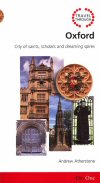
For more than a millennium, the city of Oxford has been at the heart of England’s scholastic, political, and religious life. Popular Christian movements have been born here, resulting in radical reform and far-reaching revival. In this lively account, we meet a courageous princess, an outspoken reformer, three martyred bishops, a puritan vice-chancellor, zealous undergraduates, and an atheist academic who became a Christian apologist. This is the tumultuous story of Oxford, from earliest times to the present day.
Andrew Atherstone is a tutor in history and doctrine, and Latimer research fellow at Wycliffe Hall, Oxford. He is currently engaged in a major project researching the history of Oxford evangelicalism. His publications include Travel with the Martyrs of Mary Tudor and Oxford’s Protestant Spy: The Controversial Career of Charles Golightly.
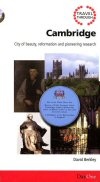
Cambridge is a world-famous university with a top reputation for scientific work, discoveries, and high-tech inventions. But for centuries, theology was the major subject studied; all students were obliged to enter holy orders until very recent times. For this very reason, Cambridge naturally became the cradle of the English Reformation. This volume explores how the relationship between religion and science is crucial to the story of Cambridge.
David Berkley obtained his degree at Oxford and went on to teach modern languages and religious education. A lay minister, he retired to Cambridge in 1997, becoming an official guide for Christian Heritage based at the Round Church and the tourist office.
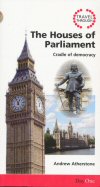
Perched on the banks of the River Thames at Westminster, the Houses of Parliament are among the most iconic buildings in the world. For generations, they have stood at the center of the United Kingdom’s national political life, and have often been called “the cradle of democracy.” This book walks you through the history of Parliament from the Middle Ages to the present day, including such dramatic events as the Gunpowder Plot, the Civil War, the assassination of the Prime Minister, the suffragette protests, and the Blitzkrieg. It focuses especially on how the Christian faith has shaped parliamentary debates and ideals through the centuries.
Andrew Atherstone is a tutor in history and doctrine, and Latimer research fellow at Wycliffe Hall, Oxford. He is currently engaged in a major project researching the history of Oxford evangelicalism. His publications include Travel with the Martyrs of Mary Tudor and Oxford’s Protestant Spy: The Controversial Career of Charles Golightly.
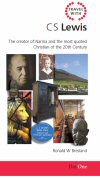
When C.S. Lewis’ grandfather hand-carved a wardrobe out of black oak to adorn his family home, he had little idea that it would provide his grandson with the inspiration for one of the world’s best-loved stories. The wardrobe stood for a time in the family home in Belfast, exerting a curious attraction for the children in the house. Two of Lewis’ cousins remember sitting inside it, the door ajar, while the young boy held them spellbound with his stories. This young storyteller would become the author of one of the most famous books in the history of children’s literature, The Lion, the Witch and the Wardrobe. In this guide, the author describes how the atheistic Clive Staples Lewis became the most widely-quoted Christian writer of the twentieth century, and explores the places that inspired Lewis’ stories.
Ronald W. Bresland is one of the leading authorities on C.S. Lewis’ Irish life and background. He was formerly a Cultural Traditions Fellow of the Institute of Irish Studies at the Queen’s University of Belfast. His book, The Backward Glance: C.S. Lewis and Ireland, explored the many connections between C.S. Lewis and his home country. He has lectured and contributed to documentaries on Lewis in the UK and US, and is currently working on an illustrated book, C.S. Lewis: An Irish Companion.
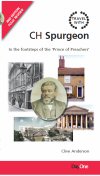
Few have combined so many gifts and achievements in such a short lifetime as Charles Haddon Spurgeon. During his 41 years as a Christian pastor and preacher, Spurgeon published 150 books, while preaching regularly to congregations of 6,000 and launching almost 70 charitable causes, many of which still exist today. His impact was so great that over a century after his death, he is still read by millions of people around the world. Travel with C.H. Spurgeon will enable you to follow his life and retrace his journey from a teenage country pastor to pastor of the largest congregation in London.
Clive Anderson is a member of the British Museum Society, the British Institute for the Study of Iraq, the Egypt Exploration Society and the Tyndale Society. He is the author of Face2Face with Sennacherib, Opening Up 2 Peter, Opening Up Nahum, and several other commentaries. He often leads tours to the Middle East.
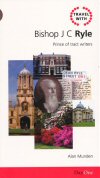
During his 36 years as a country clergyman in Suffolk, J.C. Ryle wrote nearly 200 tracts, historical biographies, and biblical commentaries. These publications resulted in notoriety outside of his rural parish, and soon the established preacher became a popular speaker at national meetings and conferences. In 1880, he became the first Anglican Bishop of Liverpool, and served in that capacity for the next 20 years. This guide illuminates the effects this great man and his insightful writing had on the people and places of the English countryside.
Alan Munden is a Church of England minister who has served in Cheltenham, Jesmond, Newcastle upon Tyne, Coventry, and North Warwickshire. His main historical interest is in the development of Anglican Evangelicalism.
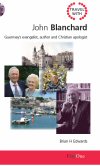
With eighteen million copies of his books in print in more than 50 languages, John Blanchard is one of the UK’s most popular contemporary defenders of the Christian faith. His clear grasp of current issues and his sharp mind and wit are enhanced by an immaculate ability with words. Blanchard’s insatiable appetite for work and travel have led him into almost every corner of the United Kingdom, across large swathes of the United States, South Africa, and elsewhere, covering over a million miles. Above all, he possesses the passion of an evangelist whose preaching and writing have led thousands to faith in Christ. This volume guides you to the most significant places in the Blanchard’s career and life.
Brian H. Edwards is the author of 20 books, including The Ten Commandments for Today, The Divine Substitute: The Atonement in the Bible and History, and Grace: Amazing Grace. One of his historical biographies was the basis for a BBC television film. He is an international speaker and a member of the Tyndale Society.
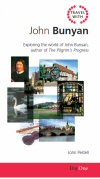
Seventeenth-century England was an unrefined place, but men like John Bunyan sought to bring the healing Word of God to it. With this unique guide, you can learn the fascinating details of John Bunyan’s life while seeing the places he lived. Included are photos and details covering the tiny hamlet where he was born, the church where he preached, and the prison where most of his writings were penned. Learn the story of this influential Christian writer by visiting the places of his past, or by reading along from home.
John Pestell grew up in the same village as John Bunyan: Elstow, England. As an infant he even lived in Bunyan’s former cottage. He has an intimate knowledge of both the Bible and Bedfordshire, and is considered a great Bunyan expert.
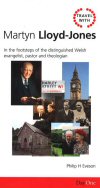
By the time of his death in 1981, Martyn Lloyd-Jones had occupied one of the most influential pulpits in London for 30 years, and his ministry had changed the spiritual direction of thousands of people worldwide. Those who heard and respected him included C.S. Lewis and eminent Cambridge historian, G.M. Trevelyan. Hundreds of students and young pastors found their minds and ministries molded by his powerful preaching and persuasive wisdom.
Philip Eveson obtained a degree in biblical studies from the University College of North Wales in Bangor, before completing other courses in Cambridge and at King’s College in London. He has preached and lectured in Ghana and across Asia, is chairman of the Red Sea Mission Team, British Home Council, and a director of Go Teach. He is the author of several books including, The Great Exchange, The Beauty of Holiness: Leviticus Simply Explained, and The Book of Origins: Genesis Simply Explained.
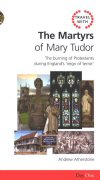
Bishops, teenagers, men, women, the elderly, and the blind—none was spared the cruel vengeance of Mary Tudor in her attempt to rid her realm of all who followed the Protestant faith. Memorials to some of the more than 280 martyrs who died during Mary’s brief but terrible reign are located across England and into Wales. The martyrs’ agony in the often slow-burning fires is a testimony of firm faith and strong conviction. This guide tells the stories of a few of those brave men and women. Large drawings and maps guide the traveler to the key locations associated with the lives and ministries of these great saints. A detailed timeline and color photos makes this guide equally useful for the armchair traveler.
Dr. Andrew Atherstone is a tutor in history and doctrine, and Latimer research fellow at Wycliffe Hall, Oxford. He is currently engaged in a major project researching the history of Oxford evangelicalism. His publications include Travel with the Martyrs of Mary Tudor and Oxford’s Protestant Spy: The Controversial Career of Charles Golightly.
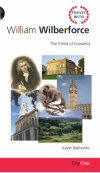
A man often overlooked in history, William Wilberforce fought a 46 year battle to abolish the slave trade and slavery itself in Britain. From his troubled youth and departure from Christianity, to his reunion with evangelical faith and his destiny, this guide helps you to understand the ups and downs that this remarkable man experienced as he labored to uphold the dignity of life.
Kevin Belmonte is an award-winning author and historian living in the seaside village of York, Maine. He has served as a script consultant for the BBC and PBS. For his biography, William Wilberforce: A Hero for Humanity, he received the prestigious John Pollock Award for Christian Biography. For six years, he served as the lead historical consultant for the motion picture Amazing Grace.
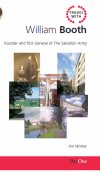
As a young man, William Booth was surrounded by poverty and suffering in the streets of Nottingham and the East End of London. These early experiences resulted in the launch of a movement against the social deprivation that brought misery to so many. Today, the Salvation Army works in over 100 countries, with 14,000 corps, and continues to impact the world. Travel with William Booth brings the reader or traveler to street level with a man whose story demonstrates a life entirely devoted to Jesus Christ.
Jim Winter has been an evangelical pastor in England for over 20 years and has preached and lectured in the United Kingdom, United States, and southeast Asia. After a long period of ministry in London’s inner city, he now lives and ministers in the south of England. He is the author of Opening Up Ecclesiastes, Depression: A Rescue Plan, and Face2Face with Elisha: Encountering the Messenger of Salvation.
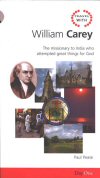
William Carey left school at the age of 12, yet was later responsible for overseeing the translation of the Bible into 40 languages. He attended no university, yet became principal of the finest college in India, still renowned for its excellence nearly 200 years later. He traveled to India with no government support, yet became the official translator for the British Raj and head of the department of languages in the government training center. His was a life of determined vision, personal tragedy, and outstanding achievement. This travel guide describes the places and tells the stories of a man who grew from humble beginnings to become the father of modern missions.
Paul Pease studied at Moorlands Bible College, and after further study at London Theological Seminary, became pastor of West Kilburn Baptist Church for thirteen years. He has served as pastor of Hook Evangelical Church in Surbiton since 1997.
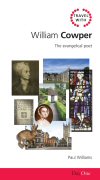
Although the name of William Cowper remains unknown to many, he was widely acclaimed as a literary genius and the greatest poet of his era. His verse was often read by royalty, and towards the end of his life, he was granted a pension by King George III. Many scholars regard Cowper as having paved the way for Wordsworth, Tennyson, Byron, Shelley, Keats, and other Romantics. He made poetry more accessible to the ordinary person, and above all, aimed to point people to God through his chosen medium. In spite of his own tragic mental depression, he was immensely successful, and is undoubtedly considered the greatest evangelical poet. Read the tales of his literary success and struggle, or travel to the places that informed his art with this volume from the Day One Travel Guide series.
Paul Williams is the pastor of Swindon Evangelical Church and Bible Institute. He also serves on the board of the European Missionary Fellowship and lectures in systematic theology at their School of Biblical Studies. He enjoys leading tours to Israel, and he is also the author of Day One’s Travel through Israel.
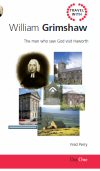
When William Grimshaw arrived at Haworth as the new parish minister, he was consumed with depression from his difficult past, and found that only a handful of people attended the church. But after God radically transformed his life, he began to pursue his congregation with renewed vigor. Within a few years, over a thousand could be found at a single communion service. His is the incredible account of an eccentric enthusiast for the Christian message. This guide is the perfect companion as you seek to follow in his footsteps on the hills of Haworth, or from the comfort of your home.
Fred Perry was the Cropwood Fellow at the University of Cambridge Institute for Criminology and wrote two books while there. He was minister at Frizinghall Congregational Church, and later became Moderator of Lister Hill Baptist Church in Leeds. He acted as honorable secretary and trustee of the Leeds European Refugee Trust which was instrumental in bringing 500 refugees to Britain during the Bosnian war.
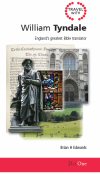
William Tyndale is undoubtedly one of the most influential of all Englishmen, and all who speak this language owe him a great debt. The significance of Tyndale’s translation of the whole of the New Testament and much of the Old from the original Greek and Hebrew into English changed the course of the Christian religion. With this guide, you can trace the course of this revolutionary thinker’s life, and visit the meaningful sites of his legacy.
Brian H. Edwards is the author of 20 books, including The Ten Commandments for Today, The Divine Substitute: The Atonement in the Bible and History, and Grace: Amazing Grace. One of his historical biographies was the basis for a BBC television film. He is an international speaker, a member of the Tyndale Society, and the editor of this Travel Guide series.